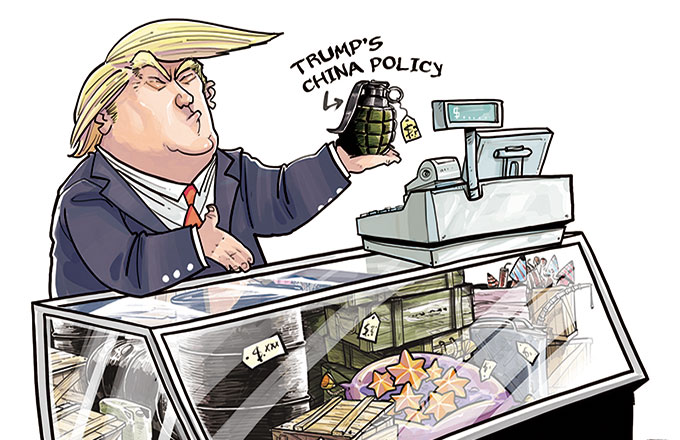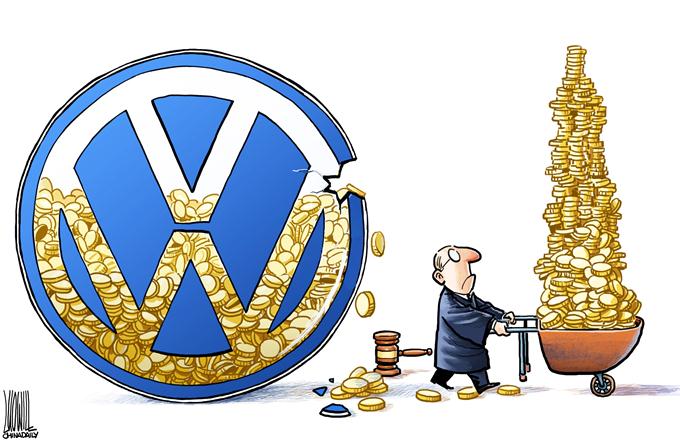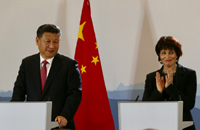Digital finance catalyst for greener global economy
 |
|
A file picture dated 14 March 2015 shows a person demonstrates the look and feel of new operating system Windows 10 for Smartphones and at the Microsoft stall at the CeBIT technology fair in Hanover, Germany. [Photo/IC] |
Political and business leaders gathered together at the World Economic Forum in Davos, Switzerland, this week to discuss the most pressing issues facing our planet and seek constructive and innovative solutions to them.
Digital finance is already the lifeblood of our global financial system. But it also gives us a platform to do so much more. We believe digital finance could also support life-saving efforts to address today's environmental challenges, helping to deliver green investments and encourage environmentally friendly lifestyles.
At stake are the world's ecosystems on which we depend, and the need and opportunity to create an inclusive green economy that provides decent jobs for all. Financing sustainable development will require tens of trillions of dollars over the coming decade, mainly private capital that has to be directed to sustainable infrastructure, such as clean energy, resilient agriculture and low carbon cities.
Green finance has risen quickly on the international policy agenda, catalysed by China's leadership during its G20 presidency. In his opening speech at the start of the two-day G20 Summit on Sept 4 last year, President Xi Jinping said the G20 had drawn up action plans in multiple fields, including sustainable development, energy efficiency and green finance, each of which he said, should be implemented seriously. Now, Italy is advancing the cause of green finance through its G7 presidency, as is the current president of the UN General Assembly Peter Thomson of Fiji. And countries across the world are building ambitious national green and sustainable finance roadmaps. Banks, pension funds and insurance companies are integrating climate and wider environmental risks into their financing decisions.
Converging with these positive developments is the impact of digital finance on the financial system itself. Financial tech-from mobile payment platforms to crowd sourcing and blockchain-will revolutionize the financial landscape. And fintech is not a solitary disruptor. It is part of a broader technological ecosystem that includes big data, artificial intelligence, and the internet of things. Together, they will digitally connect the natural world with physical goods and financial flows and assets. Tomorrow's citizens will be able to choose what to consume based on the environmental footprints of products and services. It is possible to imagine everyone having personal natural capital accounts that in turn form a basis for money itself.
Actually, such futures are already today's experiments. ANT Financial Services Group has launched a function that provides individual users of its Alipay mobile payment platform with personalised carbon accounts based on algorithms that translate an individual's carbon-saving activities conducted via the payment app into an estimate of their carbon footprint. Users are rewarded with "green energy" for reduced carbon use, which is translated into carbon-offsetting commitments by ANT. In the first four months of the trial, 54 million Chinese users have signed up and saved sufficient carbon to create an obligation to plant over 760,000 trees in Inner Mongolia autonomous region.
Digital finance has the potential to also cost-effectively finance the greening of millions of small businesses. It could be used to accelerate the evolution of green capital markets in developing countries. And there is no reason why a new generation of crypto currencies, underpinned by blockchain, should not be based on green criteria.
The UN Environment Programme and Ant Financial hope that our Green Digital Finance Alliance, launched this week in Davos, will provide a platform that brings together the world's most innovative digital finance players to catalyse ambitious initiatives to green tomorrow's global economy.
Erik Solheim is United Nations Environment Programme executive director and Eric Jing is CEO of Ant Financial.

























